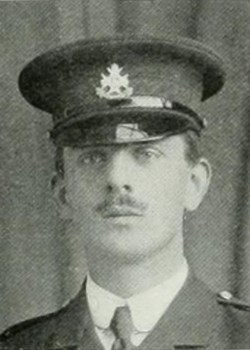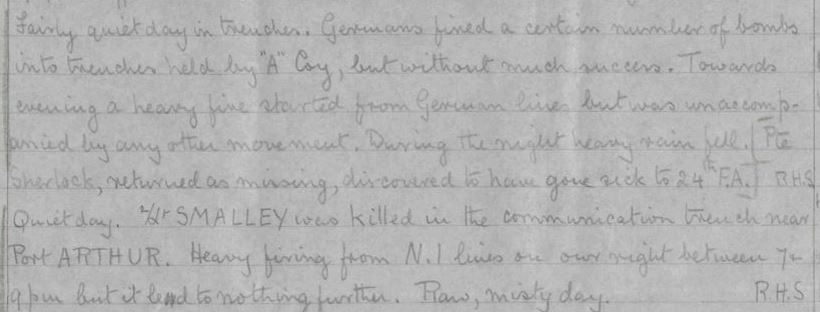9 December 1914: 2/Lt William Miles Smalley
- Home
- On This Day
- 9 December 1914: 2/Lt William Miles Smalley

William Miles Smalley, a young officer from Nottingham, was killed on this day in 1914.
Born in 1891, William was 23 years old when – in December 1914 – his battalion was in the front lines at ‘Port Arthur’ near Neuve Chapelle.

The son of William and Ann Smalley of Carlton, Nottinghamshire, William had been educated at Shenley Road Secondary School, Nottingham, and University College, Nottingham. . He entered the College O.T.C. at its inception, and quickly gained the estimation of his superiors, obtaining the "A" and "B" certificates. The Captain of the Corps spoke of him as one of his right hand men.
He received his commission in February, 1914, on the supplementary list Special Reserve. Until September 1914, William Smalley was in training with the 3rd Battalion of the Sherwoods, leaving to join the 1st Battalion on their arrival from India, and proceeding with them to France.
In an article published after his death extracts from his letters home were provided.
November 24th, 1914.
“Dear Mother and Dad – We have just come out of the trenches for what is termed three days’ rest. The idea is to spend three days in them and three days behind them. We had a rotten time in them from the intense cold at night; quite a number of men have been severely frost-bitten, and some will lose toes and feet. Rifle fire is fairly all right in the trenches, but shell fire is rotten. You cannot answer it back, but simply have to get into your little hole and chance your luck.
“I have in some mysterious way become the chief first aid man in my company. The medical officer has provided me with a medical haversack, which I have taken into the trenches, and there I generally superintend the bandaging, of all the wounded of my own company. Have had some pretty bad cases to attend to so far, nearly all of them shell fire wounded.
“If you can some time, just send me along a cake or two; I’ve forgotten what one looks or tastes like. So far we have had a fairly plentiful supply of tobacco, delivered in the trenches, also some newspapers, I got some soap and tobacco per parcel post, actually delivered whilst the Germans were firing heavily.
“Snipers are the great trouble. One gets bullets coming in from all sides. They apparently climb trees or live in the cellars of destroyed houses, and simply pop away all through the night, having first laid the rifle by day.
“In the German trenches also it seems as though they have tripods or fixed rests for their rifles, and have them sighted all the time on a loophole or a tee just at the back of our trench, or any conspicuous mark along our front. One gets bullet after bullet coming through the same loophole during the night, and always hitting the same spot in the rear. Their trenches are only about 130 yards away and so far only one attempt has been made to attack us; and I am pleased to say that my platoon sergeant spotted them starting climbing over, and get ‘em hell. They didn’t try any more just there.
“In front of our piece of trench there are quite a number of dead Germans, which it is impossible to bury. Lucky for us that it is cold, or they would smell horribly. I must say that the Germans are very good. Shell after shell drop close together, and if our machine guns open for a moment you can bet they are shelled almost immediately.
“Sorry to say we have lost two officers killed and one wounded so far. Snipers in each case did the business. During the day the enemy tries hard to be funny, and if our fellows let fly at a loophole near to where earth is being thrown over they signal with a spade that the shot was a miss. Our chaps have taken to answering them in the same way. In one place in my bit of front as fast as the men build up a loophole the Germans knock it down, and there is apparently great rivalry as to who will eventually win. So far no men have been hit just at that spot, but many have had very narrow escapes.
“Personally, I find the show anything but a picnic, but am very pleased to say that I am quite fit, well, and cheerful. Am just going to enjoy the luxury of a bath, hot. A few good cigarettes would be very acceptable.”
And from a separate letter:
“Send me a refill for my lamp week by week, and also occasionally some good cigarettes. French cigarettes are vile, and one issue of cigs. consists of 10 per week – something like 5 a penny.
“My company have got the worst piece in the whole line occupied by the Brigade, and my own platoon has the worst part of the line held by my company. This is not just my opinion, but also that of my captain and the colonel. When I started off I had 57 men in my platoon; now I muster 27. Don’t think that all the 30 are killed or wounded, because most of them are in hospital with frost-bite in their feet. Still, I have lost more men killed than the rest put together; and, of course, a corresponding number of wounded. I am occupying an advanced kind of post in front of the main line of trenches, and we are only 50 yards, at the most, from the German trenches. The main line of trenches are from 100 to 150 yards apart.
“Every loophole of mine has been knocked to bits. During two hours over 1,000 bullets hit six sandbags, so you can tell how good their shooting is when necessary.The captain has mentioned my name to the colonel for work under fire and for attending to the wounded under similar conditions; and he says he hopes and expects that I shall be mentioned in despatches. Wait and see.”


In a letter, presumably to his parents, Brigadier-General Marshall wrote of him:
"We miss him, for he possessed valuable first aid and medical knowledge rarely met with outside the profession. He had been served out with a medical pack, and was first-aid officer to our battalion (1st Sherwood Foresters)."
A Company Commander wrote: "One of the best-equipped and most brilliant young officers I ever met" and his men referred to him as one of the best officers they had ever had. He was fond of boating, swimming, and tennis, and was a clever debater and lecturer. At the time of his death he was engaged to be married to Miss F Hartshorn, daughter of Captain Hartshorn, Indian Army. The lady was serving as a Red Cross Nurse, and is a qualified dispenser.
William was originally buried in Edward Road Cemetery number 2. This cemetery was, after the war, concentrated into Cabaret-Rouge British Cemetery some miles away.







